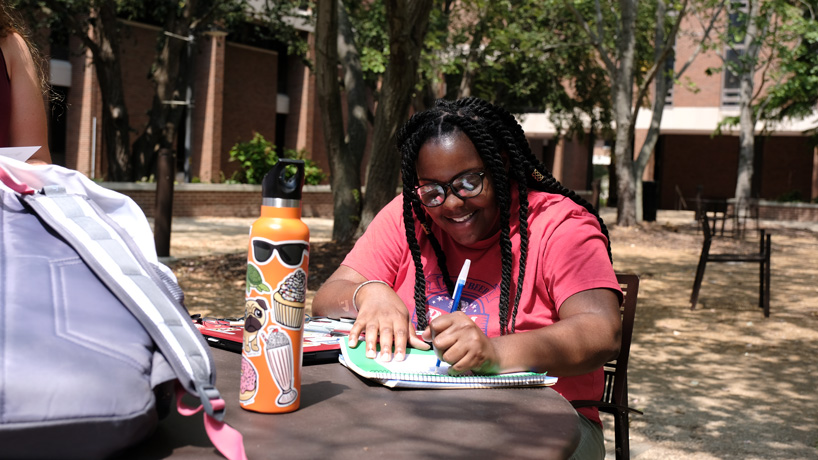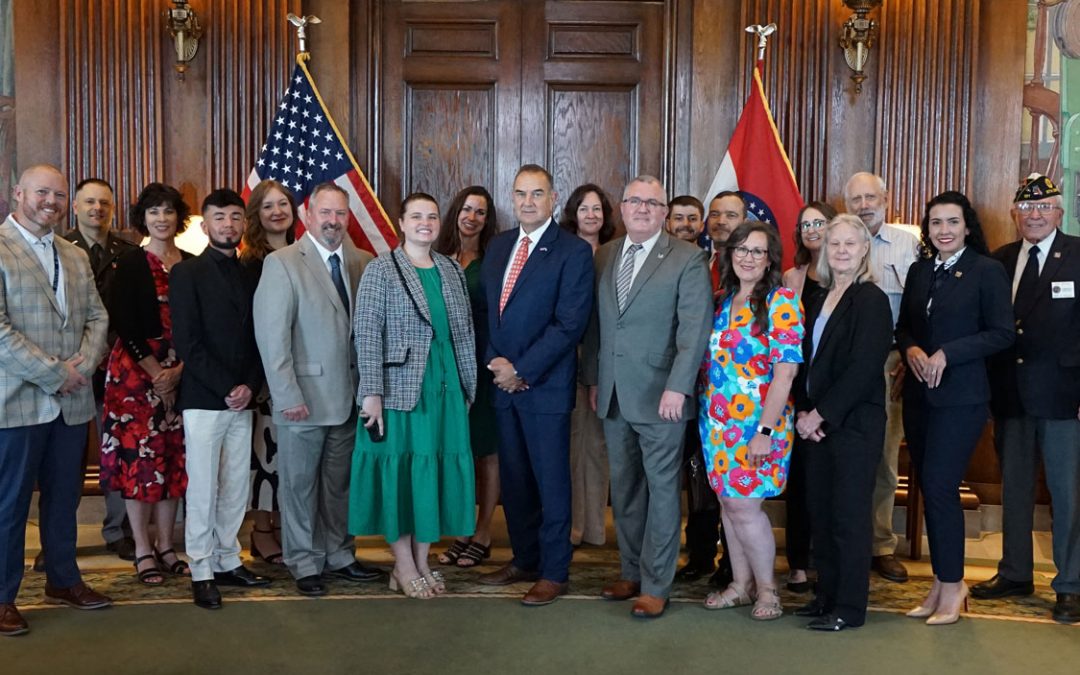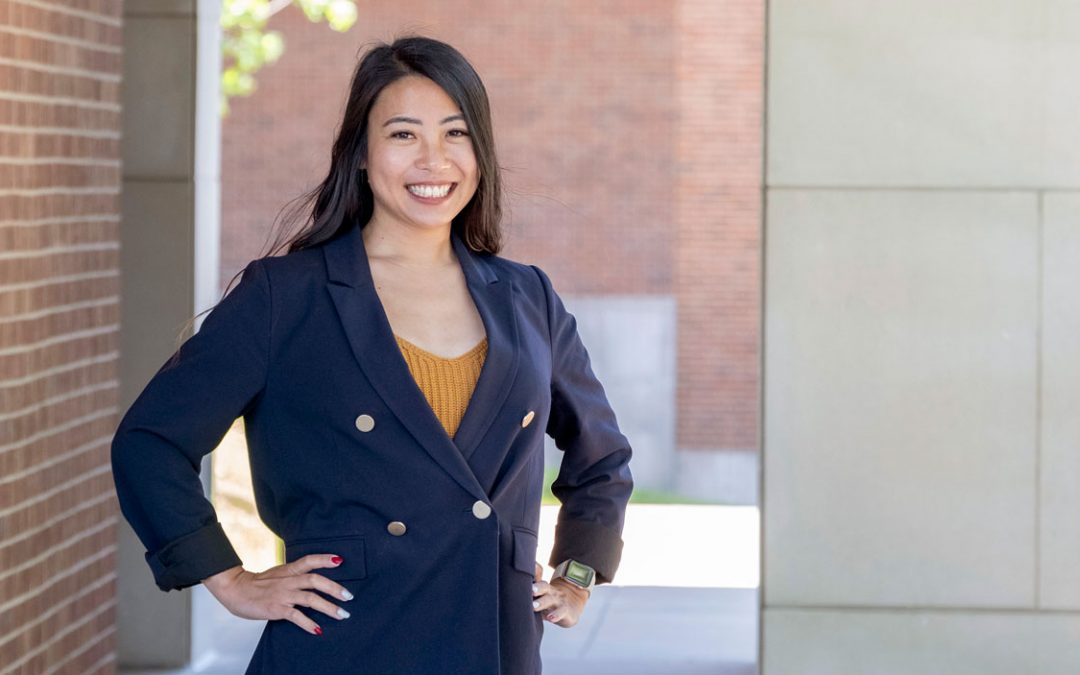
Staff members from the Center for Teaching and Learning, Student Academic Support Services and the Thomas Jefferson Library offer advice, resources and support to new Tritons who are starting an extraordinary semester. (Photo by August Jennewein)
A new, extraordinary semester is upon the University of Missouri–St. Louis, and that means a new crop of Tritons making their way to campus.
UMSL Daily talked with staff members from the Center for Teaching and Learning, Student Academic Support Services and the Thomas Jefferson Library to find out what new students can do to set themselves up for success this fall.
Go to office hours
CTL Assistant Director of Student Support Programming Jenna Alexander noted that research supports the positive effect of attending professors’ office hours.
“If students do take the professors up on their office hours, they start to form individual relationships with them,” she said. “Then they’re more likely to succeed in the course and feel connected on campus.”
Be aware of student support services
Alexander also pointed to the student support services offered by the CTL. Often, students aren’t aware of what resources are available to them.
In particular, she suggests the Supplemental Instruction program and the new Active Learning Assistant program.
Supplemental Instruction provides academic support for students in large, required or challenging courses. SI Leaders are undergraduate students who have taken the course previously and done well. They attend lectures, participate in class and hold regular study sessions outside of class.
The Active Learning Assistant program is similar. Like the SI leaders, assistants have previously taken the class, but they work more closely with faculty to create more engaging, collaborative courses – whether that’s moderating breakout sessions or helping professors create supplemental video content. Active Learning Assistants also hold study sessions outside of class.
Students can also find resources through SASS, located on the second floor of the Millennium Student Center. The unit is home to the University Tutoring Center, which helps equip students with study skills, strategies and resources to enhance their learning experience, Multicultural Student Services, and Student Enrichment and Achievement, which provides comprehensive support through academic coaching, professional development and mentoring.
“We want all students to know that we remain here for them with effective support systems and resources in place,” Assistant Provost for Access and Academic Support Natissia Small said.
Take stock of your studying and learning environments
With blended class this semester, students will be learning in the classroom and online. Alexander said it’s especially important for students to create a dedicated workspace and study schedule when learning online.
“Make a space for yourself that is separate from sitting on your bed or in front of the television,” she said. “Make a space where you can actually do your work at home or find a space on campus.”
Be familiar with Zoom and other video conferencing tools
Navigating Zoom competently will also be important for online learning. Students should familiarize themselves with all of the software’s functions.
“Zoom has a feature that allows you to essentially set up an ongoing meeting with no fixed time, and I think the students don’t realize that,” Alexander said.
Alexander added that it’s also a good idea for students to be knowledgeable of other video conferencing options – such as Slack or Microsoft Teams – in case Zoom crashes.
Don’t wait until the last minute
It might sound obvious, but Lindsey Scales, reference librarian at the Thomas Jefferson Library, said students should fight the urge to procrastinate.
“Don’t go to the library at the last minute when you get into panic mode and the assignment is due tomorrow,” she said.
Small agreed and added that asking questions early will help students clarify any concerns about assignments. She said professors can help students identify research topics and give feedback, as long as it’s not at the last minute.
Librarians will also be able to help students with assignments and conduct research more effectively with a reasonable timeline.
Understand time management
Effective time management can alleviate many last minute emergencies, but many new students struggle with it.
Small suggested strategies such as using a planner to outline day-to-day goals and due dates, following the syllabi provided by instructors and connecting with an academic coach or counselor to develop plan to stay on task.
Physical and mental health
Part of succeeding in the classroom is taking care of yourself outside of it.
“I would prioritize mental and physical health,” Alexander said. “We have counselors on campus. We have a mental health app, Sanvello.”
Small said there are several ways students can concentrate on their well-being.
“Make sure you are eating healthy meals, exercising, reading a book, getting proper rest, staying hydrated and whatever else positive that will allow time and space for self-care,” she said.
Reach out for help
Alexander and Scales both stressed that faculty and staff members are always there for students, and they shouldn’t be afraid to reach out.
“I think the focus is to reach out to your instructors,” Scales said. “Also, reach out to the librarians for as much help and guidance as possible because we’re here and we’re all in this together. This is stressful for all of us in different ways, and this is new for all of us in different ways.”
Small added that there are variety resources to address a wide range of challenges.
“We want students to know they are not alone in this new unchartered territory – we have faculty, staff and resources designed specifically to assist you in overcoming challenges,” she said. “Whether you are facing academic, financial, professional or personal challenges-our campus has areas of support in place on campus to help you work breakthrough these barriers.”
Alexander echoed their sentiments.
“Whether students are transitioning from high school to college or transferring from a community college to a larger university like UMSL, many students need to realize the importance of reaching out for help,” she said. “When students really try to meet other people, whether it’s in the class or outside of class, and start to build relationships, that’s when they can succeed.”














